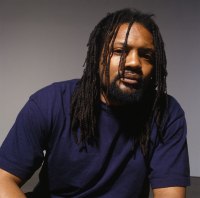In 2002-03, the Walker, local artists, and community organizations invited Rennie Harris to be in residence over the course of a year. The goals of the residency were to honor the legacies of hip-hop dance nationally while raising the visibility of the Twin Cities hip-hop dance artists, strengthening the awareness and understanding of the hip-hop art form, and providing lasting experiences for local audiences, dancers, and educators. These partnerships resulted in the Hip-Hop Moves Festival, which included the Old School Film Series (screening Wild Style, East vs. West Coast, and Style Wars), a series of discussions and masterclasses by visiting artists titled Each One Teach One, and Heroes and Innovators, an evening curated by Twin Cities choreographer Leah Nelson featuring established and new generation voices (Don Campbell, Electric Boogaloos, and the Untouchables), alongside a host of local dance artists, djs, MCs, beat boxers, spoken word and graf artists. The residency culminated with Harris’ evening-length work Facing Mekka, at Northrop Auditorium. In Facing Mekka, Harris and his 17-member company undertook an epic journey through global hip-hop set to a score performed by Grisha Coleman, beat boxer Kenny Muhammad, and vocalist Philip Hamilton. Harris used hip-hop, removed from its commercial context, to address a fractured world, linking the personal, political, and spiritual to create a unifying work between people and cultures.
Partners in the residency included Nubia, the Perpich Center for Arts Education Multicultural Voice Initiative, Lucille’s Kitchen, Sabathani Community Center, Barbara Barker Center for Dance, North High School, Harvest/SEED Academy, El Colegio, Northrop Auditorium, and the Southern Theater, making this a true community effort. . . .
Partners in the residency included Nubia, the Perpich Center for Arts Education Multicultural Voice Initiative, Lucille’s Kitchen, Sabathani Community Center, Barbara Barker Center for Dance, North High School, Harvest/SEED Academy, El Colegio, Northrop Auditorium, and the Southern Theater, making this a true community effort. . . .
Media
Related Links & Events
Biographical Information
American, b. 1964
Philadelphia-based Rennie Harris with his company Puremovement is considered one of the leading ambassadors of hip-hop and its various techniques: b-boy, house, pop and lock, stepping, and others that have emerged from America’s inner cities. An acknowledged pioneer in performing, choreographing,...
Philadelphia-based Rennie Harris with his company Puremovement is considered one of the leading ambassadors of hip-hop and its various techniques: b-boy, house, pop and lock, stepping, and others that have emerged from America’s inner cities. An acknowledged pioneer in performing, choreographing,...





